An Inside Look at Theater J
Interview with Shirley Serotsky
Jacqueline Lawton: Currently, you are the Acting Artistic Director of Theater J and prior to that you served as the Associate Artistic Director and the Director of Literary and Public Programming. What drew you to working there?
Shirley Serotsky: I moved to DC in 2001 and spent my first year completing a fellowship that allowed me to see a wide range of theater around town and to get a real sense of the values that guided each theater. Early on I saw a number of productions at Theater J that revealed the range of work they were producing at that time: modern classics and also world premieres. Seeing Homebody/Kabul (a co-production with Woolly Mammoth) in 2003 reinforced for me the idea that Theater J was a place where thought-provoking theater that asked important questions was embraced.
Being a director has allowed me to immerse myself in subjects that I didn’t have the chance to study formally so being able to research, say, ground-breaking black painters of the 1940s (like with your play The Hampton Years) or pre-WWI shtetl life in Eastern Europe (as with Yentl) is a welcome opportunity for me. Around 2007, I started coming over to Theater J to direct various readings and workshops—this led to my first main stage directing gig and then being asked to join the company as a full-time staff member.
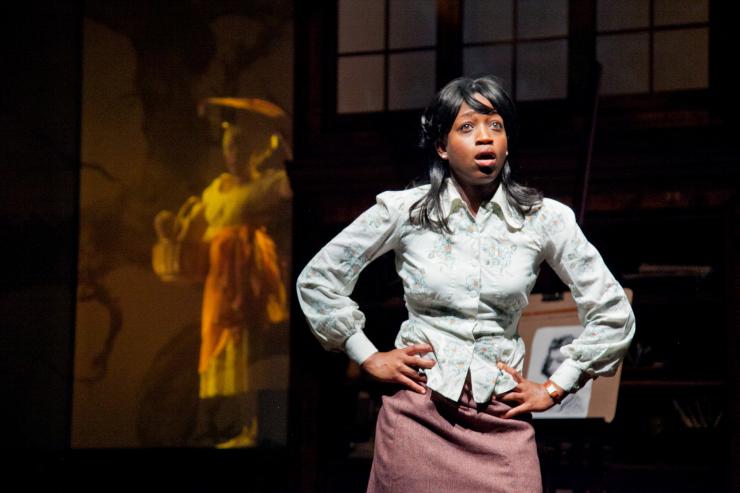
It’s that very set of values (producing theatre that invites discussion, presenting a diversity of voices, providing an inclusive gathering place for a community) that have kept me committed to the theatre.
Jacqueline: Can you speak about how Theater J functions within the DC JCC and how they might be different from other regional theatres?
Shirley: Theater J is one of several arts programs of the Washington, DC JCC—we work in collaboration with the Washington Jewish Film Festival and the Literary and Music Departments in more obvious ways (sharing theater space, cross-programming when possible) and with the other programs of the DC JCC in less obvious ways. This means we are a part of a larger, dynamic community with a broader overall mission than simply producing theater (not that producing theater is ever simple).
Jacqueline: Also, how does this relationship impact season planning?
Shirley: In a very practical way, this means when we are planning a season we are negotiating to share the spaces we use (both for rehearsals and performances) with other departments. I imagine it might be similar to a theater on a college campus, or an arts center which features multiple disciplines. We benefit from these circumstances in that it allows us to do exciting cross-programming: for example collaborating on a post-show event with GLOE (GLBT Outreach & Engagement) or presenting a film with overlapping themes during the run of a play. It also means that the interests of our community are included among the many factors we have in mind when considering the themes and styles of work that we pursue.
Jacqueline: What has been the most challenging/rewarding aspect of your job? Why have you remained committed to the theater?
Shirley: The most rewarding aspect has been the chance to be fully immersed in the art while still remaining connected to national and global politics of the time. This is a result both of the kind of material we produce at Theater J, and also because of the extensive series of panel discussions we assemble to accompany each production. In the years I’ve been with Theater J I’ve programmed literally hundreds of panels, and moderated dozens of them myself. It’s given me the opportunity to work with people from so many fields: scientists, policy makers, university professors, writers, and journalists—you name it. DC is a meeting ground for people affecting change in the world in so many different ways, and these are the people we assemble on our stage post-show to talk about a play. It’s fantastic.
It also speaks to what we at Theater J recognize as a powerful application of theater—the ability to lead us to deep and necessary conversations. I’ll recount a very recent example, one among many over the years I’ve worked here. Following a post-show panel on modern family building that accompanied our production of The Call by Tanya Barfield we received an email from one of our panelists, an expert on older child adoption, saying: “I have to say that it is very nice to see your theater choosing to tackle these challenging, emotional, and thought provoking topics. These are important things for people to be thinking of, and it is so much more ‘accessible’ in the format that you provide.” In the Q/A portion of that same talk back we had a woman share “This could be my daughter’s story! I have so many questions I want to ask now!” It’s inspiring to see theater have this effect on people—first allowing them to see the world or a particular issue in a new or sharper light, and then giving them the chance to talk about it.
As for challenges—we of course face the same battles that any mid-size, not-for-profit theatre company encounters: first and foremost among them, how do we get people into the theatre? As for specific and new challenges—we recognize that there is still work to be done to win back the trust of both the national theatre community and some of our patrons. On the inside, we knew that a split between Ari [Roth, the former artistic director] and Theater J was coming—and that ultimately, because of future desires and interests, this would be best for everyone. But this came as a huge surprise to many people. It’s now our job to prove to people that we remain as committed to the values that guide Theater J as we’ve always been.
And to answer the final part of that question—it’s that very set of values (producing theatre that invites discussion, presenting a diversity of voices, providing an inclusive gathering place for a community) that have kept me committed to the theatre.
Jacqueline: In the HowlRound article that you wrote last year, you stated, “One of the most satisfying outcomes of our expanding mission is the way in which our ‘obviously Theater J’ plays engage in a meaningful dialogue with our ‘less-obviously Theater J’ plays.” How does the 2015–16 Season continue this shift?
Shirley: I love this question! Next year is such a great example of this kind of exchange. When you look at a play like The Sisters Rosensweig, it just screams “Theater J”—Jewish playwright, Jewish characters, themes of identity and assimilation. But programming this in the same season that we are presenting Queens Girl in the World adds a whole new dimension to both works. With Queens Girl we watch the character of Jacqueline Marie Butler coming of age at the same time youngest sister Pfeni Rosensweig would have been forming her own identity—and we see these two women, one African American, one Jewish American, searching for where they fit in the world. Those kind of parallel trajectories add depth and context to each and every story we tell. In Sons of the Prophet the Lebanese American Douaihy family grapples with crises of health and community, and their relationships to one another—while in Another Way Home we have the Jewish American Nadelman family wrestling with many similar questions. And while Falling Out of Time depicts the impact of loss and grief in a region of the world Theater J very often visits (the Middle East) The Body of an American takes us to East Africa, and then around the globe, following photojournalist Paul Watson as he chases loss and grief worldwide (including right here in the US).
Jacqueline: Theater J is committed to producing plays and musicals that celebrate the Jewish cultural legacy. Are there certain plays about Jewish people or Judaism that Theater J will not produce? Can you explain why that is?
Shirley: Nothing fits this category due to content. Of course—like every theatre—there are plays that we are not interested in producing because the writing doesn’t speak to us in the way we need for material to resonate with us. But that’s about taste and style, not content.
Jacqueline: Ultimately, the stakes for freedom of speech in the arts are high and not only impact the financial health of artists and arts organizations, but also the public trust in arts institutions. Can you share your thoughts on free speech as a citizen of the US, an artist, and as artistic leader of Theater J, which is part of the DC JCC?
Shirley: I think our First Amendment rights are essential to our identity as Americans, and of course—as American theatre artists. As creators of artistic works, we enjoy the protection of the First Amendment against government restriction of artistic expression. It’s a freedom that is easy to take for granted in our generation, in our time—because it’s one we’ve always known.
That said—I think that pinning a label of “censorship” on decisions that have nothing to do with censorship is actually destructive. It’s also diminishing and demeaning to the very real battles our predecessors had to fight (during the Hollywood blacklist era and most chillingly under the Nazi regime in Germany) and the struggle against censorship that continues to rage in other countries today. Those very real restrictions and dictates are very different from programming decisions made by an organization based on their mission statement and interests, and to misconstrue the two does us all a disservice.
Jacqueline: Additionally, the issue of free speech around Israel is complex and challenging, and often has great consequences. Understanding that, what role and responsibility does Theater J have in calling attention to some of the more challenging issues that arise within the Jewish community both in the US and abroad?
Shirley: This is an interesting question—does Theater J have a greater responsibility to initiate conversations about Israel and the Middle East than other theatres do? Yes, I think we do—it’s a role we’ve always embraced and will continue to embrace going forward, because it’s a topic that is important to our community and one that continues to inspire us as artists. I think our specific responsibility is to provide a space where people all along the political spectrum (on this subject, and other subjects actually) can feel comfortable coming together and having frank conversations about these issues—hopefully sparked by the compelling art that we present.
Jacqueline: What I love about theatre is that it’s a space that holds multiple truths and perspectives. It’s a place where beliefs can be challenged, people can be held accountable, and we can all be shown a way forward. Can you speak about a production that allowed audiences to engage in complex conversation about culture, identity, and/or politics?
Shirley: For me, presenting the Cameri Theatre’s production of Return to Haifa was one of the most successful examples of cultural exchange we’ve had. Its unique collaboration allowed for such a diversity of voices (source material from a Palestinian writer, adapted by an Israeli playwright, presented by a company of both Arab and Jewish actors), and the conversations the play initiated were deep and thoughtful. The play truly put human faces on political questions, and I think that again speaks to the unique power of the theatre.
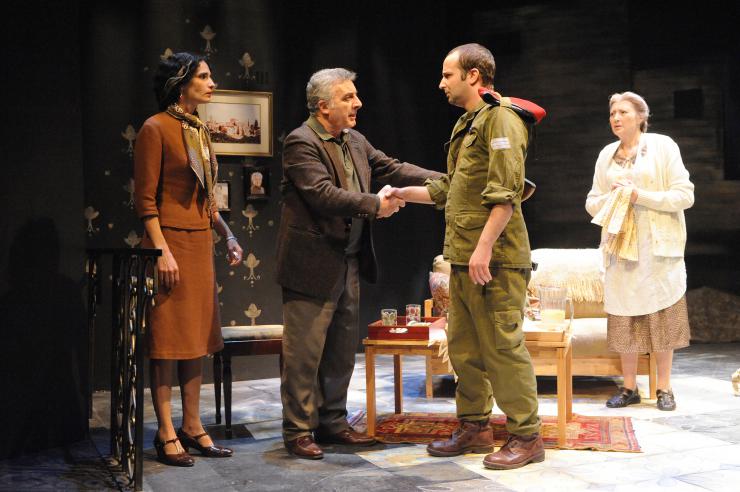
I think our specific responsibility is to provide a space where people all along the political spectrum can feel comfortable coming together and having frank conversations—hopefully sparked by the compelling art that we present.
Jacqueline: When you think back on the past seven months, what stands out in terms of learnings and achievements for you and your staff?
Shirley: We’ve been so proud to produce two world premieres since the start of the new year (Aaron Posner’s Life Sucks (or the Present Ridiculous) and Renee Calarco’s G-D’S Honest Truth) and then to travel off-site to Northeast DC to present the regional premiere of Tanya Barfield’s The Call. These plays each speak so clearly to our mission: presenting brand new work, investing in our local artists (Renee’s play came out of our Locally Grown program), and initiating cross-cultural conversations in a way that allows for great complexity.
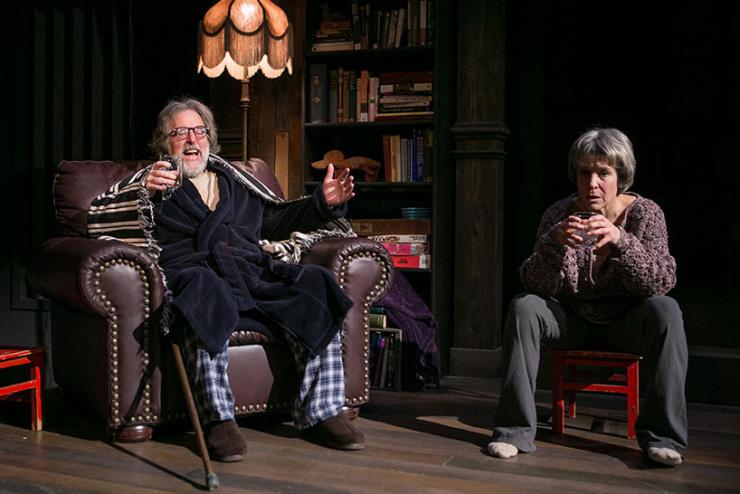
We’ve planned a season that we are all so proud of, which will present a roster of diverse artists and truly achieves gender parity. And so much of this is due to our unbelievably skilled and talented staff. We went through a real shake-up, and this group of theatre professionals remained rock steady and true to the course throughout. We’ve been more creative and forward thinking than ever—we’ve had to be. And when a system of leadership that has been in place for nearly twenty years suddenly changes, it’s an opportunity to reexamine what is and isn’t working. We’ve relished that opportunity, and I’m in awe of the talents and leadership skills exhibited by each and every member of the staff.
Jacqueline: What’s next for the theatre? What are your hopes, expectations, or concerns?
Shirley: Well—there’s an active search for a permanent artistic director, and that’s an important piece to our future. Looking at the season we’ve programmed for next year, I’d consider it a refresh of our mission rather than a complete reboot. We’re continuing to pursue the values that have long been important to us while exploring more diverse theatrical styles (a little less realism, a little more theatricality) and taking more risks when it comes to the use of language in our plays (it’s not a coincidence that three of our playwrights next year are also poets). I hope we continue to expand and explore the voice of Theater J in ways that keep us fresh, vital, and relevant. In fact—that’s my hope for the American theatre as a whole!
Jacqueline: Is there anything else you’d like for the readers to know?
Shirley: I’d just encourage people to come visit us—come see how we’re doing, and let’s continue the important conversations together.

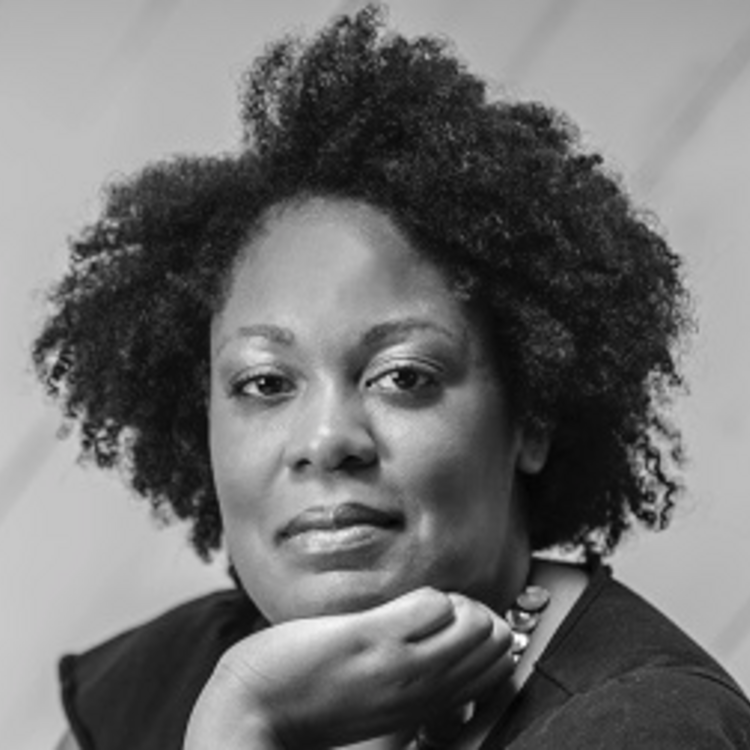
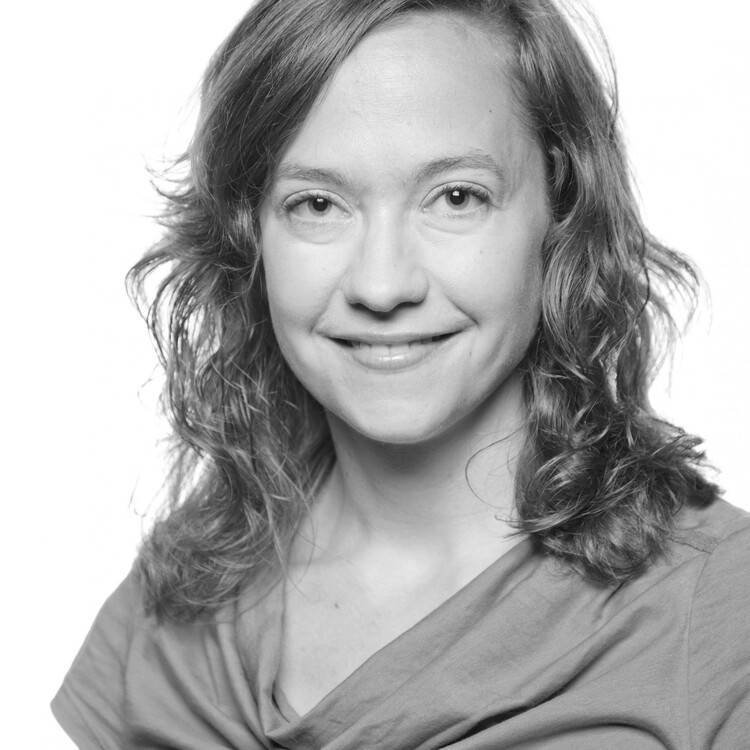



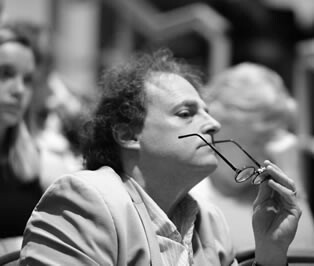


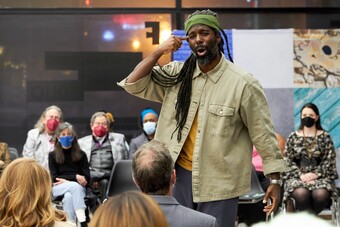




Comments
The article is just the start of the conversation—we want to know what you think about this subject, too! HowlRound is a space for knowledge-sharing, and we welcome spirited, thoughtful, and on-topic dialogue. Find our full comments policy here
No mention anywhere of Ari Roth, or Motti Lerner. Ms. Serotsky states that "people all along the political spectrum can feel comfortable coming together and having frank conversations
about these issues" but it's already been established not to be the case when the conversation displeases DC JCC donors, who threaten to withhold monetary support when they disagree with the material onstage.
Hopefully what comes out of all the change we have experienced is more good theatre for artists and audiences alike. I am very proud of what my colleagues have accomplished--Shirley Serotsky and Rebecca Ende are leading us through this transition with aplomb. As Theater J's associate producer I would like to include the names of the actors pictured in this great interview by Jacqueline Lawton and offer thanks to HowlRound for posting it: The Hampton Years—Lolita Marie, Crashonda Edwards; Yentl—Michael Kevin Darnall, Shayna Blass; Return to Haifa—Raida Adon, Suheil Haddad, Erez Kahana, Rozina Kambos; Life Sucks—John Lescault, Naomi Jacobson.